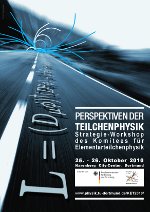 |
 |
|||||||||||||
|
|||||||||||||
|
|||||||||||||
|
Germans enjoy punctuality, and Germans like to plan ahead. Though these may sound like tired clichés, the German particle physics community recently lived up to international expectations and met for a workshop to set the strategy for particle physics in Germany in the years to come. The physicists were asked by their funding agency, the German Federal Ministry of Education and Research, to map out the future and present their interests and priorities — next year the European Strategy for Particle Physics will plan a strategy that takes into account the latest results from the LHC. As one of the major players in Europe, Germany wants to be prepared. The overall strategy process will conclude in September 2012 with a new strategy for Europe. The German community is well connected through structures like the Helmholtz Alliance and represented by the committee for elementary particle physics, KET in its native abbreviation. KET is also the organiser of this workshop and will be the body that speaks for the country's particle physicists in recommending a future strategy. There are some 40 institutes and more than 2000 particle physicists (from student to professor) in Germany. More than 100 of them came to Dortmund in the Ruhr area, the current 'cultural capital' in Europe and home to KET's current chairman, to present and discuss their priorities for a German high-energy physics strategy. The committee now has to distil the two days of discussions down to a list of recommendations, which will be discussed and decided at the annual KET meeting in late November. All possible walks of particle physics were covered in the talks — from the obvious LHC plans, linear colliders, neutrino, flavour and astroparticle physics to theory and nuclear physics, always with a view on the projects that German universities are or would like to be involved in, the big questions of physics and the country's particular strengths. In his talk about LHC upgrade plans and scenarios, for example, Norbert Wermes, professor at the University of Bonn and scientist working on the ATLAS experiment at the LHC, pointed out that R&D for and the actual building of detectors is a "German speciality" because many universities have set up large labs and workshops that keep many students busy — and give them valuable experience working on hardware. One of the biggest hardware adventures in the next years – apart from building detectors for the linear collider, of course – will be building upgrades for LHC detectors for its next phase, one of the priorities on the strategy list. German groups are already contributing up to 15 % of the upgrade programme. The ILC itself is also on the strategy list as 'next-generation e+e- linear collider', along with CLIC, as are support for a b factory, continued detector and accelerator R&D, and other items. The community will prepare an update of the original strategy brochure after their meeting in November. ILC NewsLine will closely follow the process that leads to an updated European strategy for particle physics. -- Barbara Warmbein See all talks here (most slides are in English) |
|||||||||||||
| © International Linear Collider |
